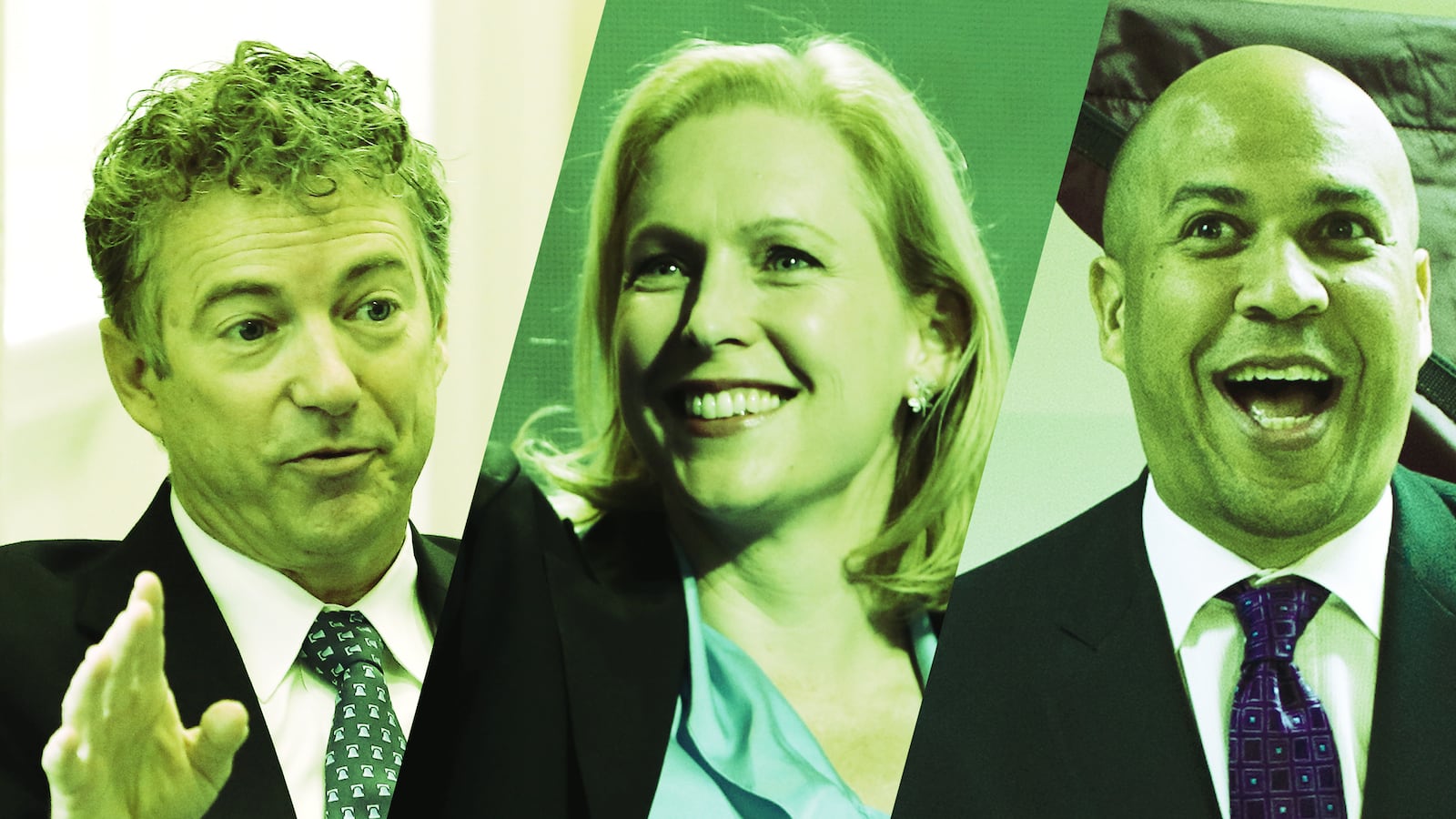Spirits were high in Washington, D.C., Monday night as news broke that three senators plan to introduce a bill to Congress on Tuesday aimed at ending the federal ban on marijuana.
While the details of the legislation remain largely unknown, the nature of the bill itself represents a radical contradiction for a federal government who still defines marijuana as one of the most dangerous substances in the world.
Senators Rand Paul, Kirsten Gillibrand, and Corey Booker are the official sponsors of the Compassionate Access, Research Expansion and Respect States (CARERS) Act, which they plan to unveil at a live press conference Tuesday afternoon. The YouTube link for the much-anticipated event is already live, displaying a countdown until the big reveal.
For medical marijuana patients, veterans, and drug policy activists, the clock can’t move fast enough. Experts estimate that there are over 1.3 million registered medical marijuana patients nationwide—some of whom have spent years waiting for the drug.
It’s not the first pot policy reform bill to be introduced to the House, but Director of Federal Policies at the Marijuana Policy Project (MPP) Dan Riffle believes it’s the one that may actually incite change.
“This is a proposal that Republicans and Democrats should both be able to get behind. It’s a matter of compassion and justice, states’ rights, public safety, and medical choice,” says Riffle. “There is no rational reason to maintain laws that prevent doctors from recommending medical marijuana, prohibit seriously ill people from using it, and punishing those who provide it.”
According to a joint statement from the three senators behind it, the bill aims to “make overdue reforms to ensure patients—including veterans receiving care from VA facilities in states with medical marijuana programs— access the care they need.” In the 23 states that have legalized medical marijuana, plus the District of Columbia, it would “allow patients, doctors, and businesses… to participate in those programs without fear of federal prosecution.”
The news falls on the heels of a groundbreaking General Social Survey, which is widely seen as the seminal source for societal trends. It found a majority of Americans to be in favor of legalizing pot for the first time. Of the more than 1,600 respondents in the study, 52 percent voted for marijuana to be legalized—nine percentage points higher than the same metric in 2012.
Morgan Fox, communications manager for MPP, said the results reveal a shift in the way pot is viewed. “Marijuana has been a relatively prominent part of American culture for decades, and that’s never going to change. Either we continue to force it into the underground market or we start regulating it and treating it like other products that are legal for adults,” says Fox. “Federal and state officials who are clinging to marijuana prohibition need to get over it and allow society to move forward.”
Mark Kleiman, one of the foremost authorities on drug policy in the U.S., likes the idea of the federal government “getting out of the way,” but says the bill raises more questions than it answers. One of the most pressing: “Does the bill do anything to lower the barriers to clinical research, so we can take cannabis preparations out of the medicine show/snake oil aisle and treat them like genuine pharmaceuticals?”
While access to medical marijuana has gotten significantly better, the classification of it as a Schedule I substance still poses huge obstacles for those attempting to study it on humans. Dr. Sue Sisley, one of the only researchers in the nation with permission to test cannabis on humans, was in Israel when the news broke.
She’s there, ironically, attempting to conduct a study of cannabis as treatment for PTSD in veterans—one she was required to take overseas after being fired from the University of Arizona. In the more than five years Sisley has devoted to this study, she’s run into roadblock after roadblock—most recently, obtaining the actual plant. “I’m in Israel trying to implement our veterans marijuana research out here because our own federal government is unable to grow two of the four strains required by our protocol,” she says.
Her story provides an interesting backdrop for an event that’s being hyped as a momentous one in America. Allowing patients access to medical marijuana is one thing, getting drug companies to back testing for a substance with low profitability is entirely another. Still, Sisley is hopeful that Tuesday's announcement will include good news for the research world.
“This could represent one of the most historic shifts in drug policy reform, tons of great bipartisan minds coming together to draft this bill,” she says. “Our U.S. government has systematically impeded marijuana efficacy research for decades. The opportunity to eliminate some of the redundant and indefensible barriers to marijuana research is a crucial aspect of this proposed legislation.”






